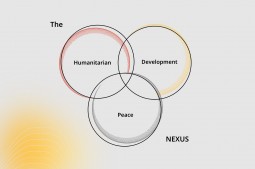Humanitarian-Development-Peace Nexus

Why
In December 2019, we hosted the event "Building Resilient WASH Systems in Fragile States" at UNHCR in Geneva on behalf of the German WASH Network and together with the Global WASH Cluster, Sanitation and Water for All, UNICEF and IFRC. This was the first time that development and humanitarian actors met with equal participation. In response to the outcomes of the event, the nexus between humanitarian assistance and development cooperation was anchored in both the Humanitarian Road Map 2020-25 and SWA's Strategic Framework 2020-2030. Based on this, a consortium of partners was formed to implement the Road Map 2020-25 initiative "3.5 WASH Triple Nexus," which GTO is coordinating on behalf of the WASH Network.
The background to the initiative is the recognition that humanitarian, development, and peace actors in the WASH sector too often work side by side rather than together. It is increasingly clear that this isolated approach is not practical in many fragile contexts and protracted crises. More than three-quarters of people suffering extreme poverty live in fragile contexts. At the same time, 40% of all fragile states are vulnerable to severe or extremely severe water stress. Humanitarian crises occur more frequently with climate change, affect more people, and last longer. Only one in ten fragile countries is on track to achieve universal access to basic sanitation, while coverage is declining in nine countries.
With the ‘Joint Operational Framework: WASH Resilience, Conflict Sensitivity and Peacebuilding’ (see download section) the initiative has a joint operational framework for contexts with recurrent and protracted crises, which is intended to enable better cooperation between humanitarian, development and peace actors. The JOF explains current Nexus thinking, develops a Theory of Change, nine operational principles and a guide with practical entry points and tips for key steps in the implementation of the Nexus approach by the WASH sector.
Since 2024, the English-language e-learning course ‘Building WASH Resilience, Conflict Sensitivity and Peace’, which can be completed on the IRC WASH Systems Academy learning platform, has been available in addition to the publication. This course provides clear steps, examples and recommendations for better linking humanitarian aid, development cooperation and peace-building measures - especially in fragile and climate-vulnerable areas.
Facts
- 1,8BillionPeople live in fragile contexts
- 40%of fragile states suffer from severe water stress
Theory of Change
In response, the initiative aims to generate global support to help WASH decision makers and field practitioners operationalize the nexus approach in fragile contexts and protracted crises. To do this, the initiative is developing an evidence-based framework for action, based on intensive consultation and country-specific best practices. The goal is to empower humanitarian workers and development practitioners to promote the resilience of local WASH systems. This is intended to both relieve pressure on the humanitarian system and ensure sustainable developments. In fragile states and conflicts, it also aims to increase the conflict sensitivity of WASH programs in order to contribute to stabilization and peace in these contexts.
In the long term, closer collaboration between humanitarian aid, development and peacebuilding efforts is the only way we will achieve the SDGs and leave no one behind.
António Gutteres, UN Secretary-General, 2022